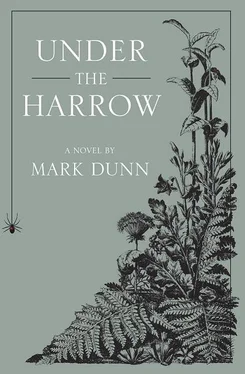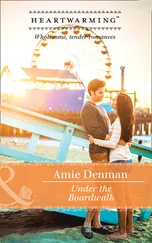The abandonment, as necessary as it appeared to have been, was made ever the more difficult to bear by the fact that every child, save one, had been left illiterate, the need for the children to learn to read having been superceded by the far more important vocational imperative. Were it not for a certain sewing teacher by the name of Miss Ruby Johnson and her ardent, most-favoured pupil, one Miss Henrietta Weatherfield, the young denizens of Dingley Dell would have been left severely wanting in the means by which they might further an education that did not employ, for example, the loom, the gimlet, the anvil, the bread-pan, or the awl.
The subversive Miss Johnson, as things turned out, had taken it upon herself to secretly violate the rule prohibiting the teaching of any of the orphaned children to read — a hard rule that was meant to be strictly enforced without exception. Every night for a good many months Miss Johnson, through whisper and tiptoe, had invited a most zealously compliant Henrietta to her private bedchambers to take up the Bible, or the elementary grammar, or a worn and ragged copy of The Eclectic First Reader for Young Children, with Pictures .
Over time, Henrietta had learnt to read quite well — an irony in that initial season, since, with the sudden exodus of all of the adults, there was nothing left behind for her to read, the teachers having hastily stuffed all of their books and journals and every scrap of personal correspondence into bulging carpetbags and capacious portmanteaus.
Except…(And it is a most amazing “except” to be sure!)…for a small library, perhaps overlooked, perhaps deliberately hidden, which was discovered in late summer of that same year by two exploratory little boys. The books were found half-buried in the dirt floor of an infrequently visited fruit cellar — a singular hoard of volumes that had not been hurriedly and irrecoverably carpetbagged! A collection of books, which at that point and ever thereafter, comprehended the entire bibliographic corpus, the full sum and substance of reading matter emanating in the Outland:
— A complete twenty-five-volume set of the ninth edition of the Encyclopædia Britannica (1878–1889).
— The Holy Bible , King James Version.
— A dictionary (unfortunately missing its cover, frontispiece, title page, and the leaves which comprised those terms from “Aa” to “Ash”).
— McCormick’s Atlas of the World, copyright 1872.
and a set of
— The Complete Novels of Charles Dickens from The Pickwick Papers to the unfinished The Mystery of Edwin Drood.
There was one other book purported to be found amongst the volumes of the fruit cellar cache, which disappeared very soon after the discovery, only to be discovered the next year accidentally shredded in a cornfield between the teeth of a harrow. The book was titled Around the World in Eighty Days, and it had been written by a Frenchman by the name of Jules Verne.
But for the youthful “First Generationers” of Dingley Dell, the “Fruit Cellar Library” constituted an education that would prove to be quite broad in scope and which sufficed to define this receptive league of children and their multiple generations of descendents as English-speaking and English-reading expatriates of some greater Britannic realm. With those soilbegrimed volumes as tool and guide, and young Henrietta Weatherford as first in a long procession of teachers who would add English language proficiency and scholastic erudition to the proud list of our skills and talents, we succeeded over the course of the next century in making our microscopic world slightly less insular, while keeping our collective identity unmistakably… Dinglian.
Here is who we were in those early days and the many weeks, months, and years that followed: proud citizens of a state with an affinity for things English (and largely Victorian, for we had no other frame of reference), yet possessed of a conversely noble independence in those acquired attributes that distinguish and commend a people in isolation — people who must proceed upon intuitive inclination in those areas of acculturated human interaction in which Mr. Dickens and the otherwise accommodating authors of the Encyclopædia Britannica do not apprise. We were a people set adrift by unfortunate, even tragic, circumstances, yet blest by a set of implements-of-the-mind (either accidentally or purposefully left to us), which, in combination with the directives of our own hearts and our own God-given analytical, probing natures, allowed us to navigate our future, even though the course that lay ahead be mirky and disadvantageously adumbrated.
To these books we superadded volumes of our own, created from our very own pens, as we sought to enlarge and aggregate that initial Fruit Cellar Library with the works of writers of our own society (such as the one you are now reading). We did this not only to consolidate our many voices into one, but because, in more practical terms, the tradesmen who came each fortnight to deliver the outside goods that we required brought us no new volumes to read and extol. Each request garnered the same response in the very same words: “We have no books to bring you because there are no books.” The reply was always delivered with a shrug and in an invariant tone that hinted little at deliberately concealed meaning, and over time our brokers learnt to stop asking. How curious, we privately mused, that this world beyond our vale should be possessed of no new books, or perhaps of no books at all! We were given to imagine book burnings — great conflagrations that reduced every volume to ash. Perhaps, we thought, the leaves of their heritage books were required to heat their homes — sick-houses in which legions of Beyonders lay alternately febrile and shivering with some deadly ague, related, we surmised, to the plague that had originally estranged us.
The tradesmen brought us no new books, or anything else, for that matter, that one could deem “new.” It seemed that everything which was essential and provident for human use in the year 1890 was replicated year after year after year upon their rumbling wooden hand-trucks and wobbling barrows. Nothing appeared that hadn’t been seen before. Nothing appeared that wasn’t historically familiar. How sad, we thought, that industrial progress had become so thoroughly arrested outside our border, when within the Dell, we continued to devise and invent and experiment in the name of societal improvement and technological advancement (that is, when we weren’t keeping too comfortably to the old and familiar ways ourselves).
It was not empty boast to say that the candles our chandlers fashioned and sold in the year 2000 burned almost twice as long as did those in use in 1890!
Enterprise, thy name was and always will be: Dingley Dell!
DINGLIAN DAY, August 14, a day set aside to acknowledge that day in 1890 upon which the works of Charles Dickens, the Encyclopædia Britannica, Ninth Edition, the Holy Bible, a dictionary and atlas were placed by fate into the hands of all Dinglians to their perpetual betterment. A day of celebration and patriotic pride, marked by public readings of selections from the novels of Dickens, the Holy Bible , and poetry from The Companion .
OBSESSITOR, name given to a man or woman whose behaviour is characterised by monomania, a number of the most famous Dinglians being so diagnosed, with extreme cases requiring isolation, and less severe cases arguing only for tolerance and, when possible, exploitation of the prodigious knowledge acquired to the benefit of the commonweal.
TICKET PORTER. Following the dissolution of the Dingley Dell Post-Office as a direct result of the Post-Office Scandal of 1957, portage throughout the Dell was taken up by independent Ticket Porters — for voice messages, letters and small packages — and by the Punctual Parcel Delivery Company — for the delivery of larger packages — each service in short order proving a most acceptable and efficient replacement for the discredited post-office (and each proving far less prone to abuse of the mails through neglect and after-hour strumpet parties). Ticket porters are generally fleetfooted men and older boys who use horses only for priority deliveries, although the porters who serve the PPDC always employ a heavily laden van, which, during Advent season, is driven by a man who looks very much like Dickens’ Father Christmas.
Читать дальше












